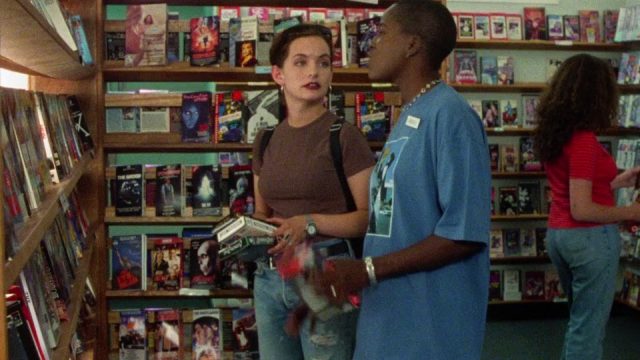Criterion Prediction #246: The Watermelon Woman, by Alexander Miller

Title: The Watermelon Woman
Year: 1996
Director: Cheryl Dunye
Cast: Cheryl Dunye, Guinevere Turner, Valerie Walker, Camilia Paglia
Synopsis: Cheryl (Dunye), a young, gay, black filmmaker, becomes enamored with a lesser-known actress from the 1930s known as “The Watermelon Woman” who played “mammy” roles in southern dramas. Cheryl’s fascination leads her on an adventurous project to find out the legacy behind the enigmatic actress while juggling her job at a video store, her best friend Tamara, her love life, and being an out black woman in America.
Critique: What a breath of fresh air. A self-made, self-styled, work of art that’s teeming with substance; that’s light, breezy, and insightful; that’s just as moving as it is hilarious. The Watermelon Woman is, in the truest sense, a fearless film. Dunye takes it all on and, most importantly, does so with such an open degree of confidence that the film is inspiring. The film is about being an openly gay, black woman played by the director Cheryl Dunye (whose character is named Cheryl). But, it’s a story of a filmmaker whose personal identity motivates her creative pursuit. Cheryl’s journey is the meat of the film, but there’s room for her personal life to fill the screen, and often, the two lines converge, and as many creative types will agree that your passion will consume your life. When Cheryl “meets” (through an old movie) the eponymous Watermelon Woman, she’s transformed, and it’s that feeling any of us can relate to when we’re excited by a movie or work of art. Our maturity subsides, and we almost regress into a childish state of excitement, and no matter how much we rave to our friends, we can’t understand why they don’t share your enthusiasm.
From the synopsis, this might read like a sobering examination of race and gender, when, in all actuality, The Watermelon Woman is a cheerful and funny film that looks on the brighter side of life without being saccharine or disingenuous. We see Cheryl pal around with best friend Tamara, a relationship that is sometimes fraught (as is the case with best friends) she finds dates with beautiful women, sniffs out leads by networking with the gay community. Namely, the Center for Lesbian Information and Technology ( the “CLIT” Foundation) is one of the film’s funniest sequences of many.
It feels like The Watermelon Woman is concerned with celebrating life and its occasional hardships rather than wallowing in misfortune. After all, haven’t we seen enough black people suffer on screen, and in real life? That’s not to say that The Watermelon Woman is escapist fare. Nor does Dunye eschew the subject of racism. Still, there’s a radiant tapestry woven together. The deeper the investigative journey takes us, the tighter it ties its potent allegory of gender and race with the selective history of film. Dunye assembles the film with a free-jazz style; the diaristic documentary footage has the wry wit and poignancy of Ross Mcelwee’s works of archival self-discovery. The closest Cheryl gets to the life of Faye’ The Watermelon Woman’ Richards, it is pointed out that she shouldn’t get hung up on the racist, mammy characters of her career because there’s so much more to Richards’ life, career and times. In so many ways, it feels like this film is a reminder that the brighter of life is the side to embark.
Why It Belongs in the Collection: In these uncertain times, it’s hard not to make some kind of call for representation and, in doing so, it feels like a title like The Watermelon Woman is the right way to go in terms of uniting people. The Criterion Channel is showcasing a bevy of films helmed by black filmmakers and, out of them, Dunye’s debut feature is the one that would benefit most from a spine number.




























